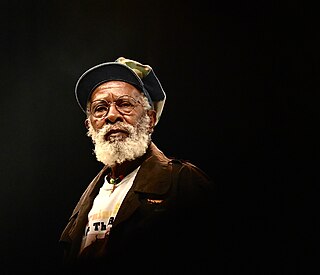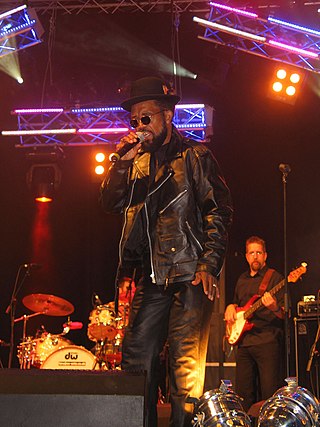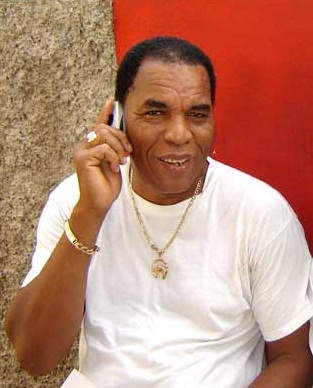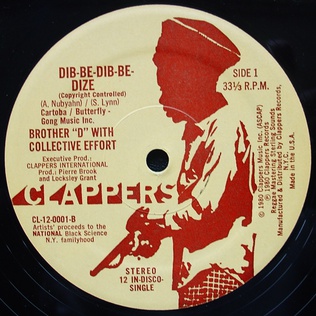
Winston Rodney OD, better known by the stage name Burning Spear, is a Jamaican roots reggae singer-songwriter, vocalist, and musician. Burning Spear is a Rastafarian and one of the most influential and long-standing roots artists to emerge from the 1970s.

Doo-wop is a subgenre of rhythm and blues music that originated in African-American communities during the 1940s, mainly in the large cities of the United States, including New York, Philadelphia, Pittsburgh, Chicago, Baltimore, Newark, Detroit, Washington, D.C., and Los Angeles. It features vocal group harmony that carries an engaging melodic line to a simple beat with little or no instrumentation. Lyrics are simple, usually about love, sung by a lead vocal over background vocals, and often featuring, in the bridge, a melodramatically heartfelt recitative addressed to the beloved. Harmonic singing of nonsense syllables is a common characteristic of these songs. Gaining popularity in the 1950s, doo-wop was "artistically and commercially viable" until the early 1960s and continued to influence performers in other genres.
Dub is an electronic musical style that grew out of reggae in the late 1960s and early 1970s. It is commonly considered a subgenre of reggae, though it has developed to extend beyond that style. Generally, dub consists of remixes of existing recordings created by significantly manipulating the original, usually through the removal of vocal parts, emphasis of the rhythm section, the application of studio effects such as echo and reverb, and the occasional dubbing of vocal or instrumental snippets from the original version or other works.
Dancehall is a genre of Jamaican popular music that originated in the late 1970s. Initially, dancehall was a more sparse version of reggae than the roots style, which had dominated much of the 1970s. In the mid-1980s, digital instrumentation became more prevalent, changing the sound considerably, with digital dancehall becoming increasingly characterized by faster rhythms. Key elements of dancehall music include its extensive use of Jamaican Patois rather than Jamaican standard English and a focus on the track instrumentals.

Rude boy is a subculture that originated from 1960s Jamaican street culture. In the late 1970s, there was a revival in England of the terms rude boy and rude girl, among other variations like rudeboy and rudebwoy, being used to describe fans of two-tone and ska. This revival of the subculture and term was partially the result of Jamaican immigration to the UK and the so-called "Windrush" generation. The use of these terms moved into the more contemporary ska punk movement as well. In the UK and especially Jamaica, the terms rude boy and rude girl are used in a way similar to gangsta, yardie, or badman.

Desmond Dekker was a Jamaican ska, rocksteady and reggae singer-songwriter and musician. Together with his backing group the Aces, he had one of the earliest international reggae hits with "Israelites" (1968). Other hits include "007 " (1967), "It Mek" (1969) and "You Can Get It If You Really Want" (1970).
Donat Roy Mittoo, better known as Jackie Mittoo, was a Jamaican-Canadian keyboardist, songwriter and musical director. He was a member of The Skatalites and musical director of the Studio One record label.

Christopher Percy Gordon Blackwell OJ is a Jamaican-British former record producer and the founder of Island Records, which has been called "one of Britain's great independent labels." According to the Rock and Roll Hall of Fame, to which Blackwell was inducted in 2001, he is "the single person most responsible for turning the world on to reggae music." Variety describes him as "indisputably one of the greatest record executives in history," while Barron's has described him as "a contender for most interesting man in the world."
Trojan Records is a British record label founded by Jamaican Duke Reid in 1968. It specialises in ska, rocksteady, reggae and dub music. The label currently operates under the Sanctuary Records Group. The name Trojan comes from the Croydon-built Trojan truck that was used as Duke Reid's sound system in Jamaica. The truck had "Duke Reid - The Trojan King of Sounds" painted on the sides, and the music played by Reid became known as the Trojan Sound.
In Jamaican popular culture, a sound system is a group of disc jockeys, engineers and MCs playing ska, rocksteady or reggae music. The sound system is an important part of Jamaican culture and history.

Greensleeves Records & Publishing, shortened to Greensleeves Records, is a record label specializing in dancehall and reggae music. The company was founded by Chris Cracknell and Chris Sedgwick. Based in Britain, Greensleeves Records started as a small record store in West Ealing, London, in November 1975. The record label was founded in 1977, with early releases including albums by Augustus Pablo and Barrington Levy.
Sonia Eloise Pottinger OD was a Jamaican reggae record producer. An icon in the music business, Sonia Pottinger was the first female Jamaican record producer and produced artists from the mid-1960s until the mid-1980s.

Christopher MacFarlane, better known as Macka B, is a British-born Jamaican reggae artist, performer and activist with a career spanning thirty years and one of Britain's most influential dancehall DJs.
Soul Jazz Records is a British record label based in London. Outside of releasing records, the label also publishes books, occasionally films and performs as a DJ set. The music releases labels from a variety of genres, including reggae, house, hip hop, punk rock, jazz, funk, bossa nova and soul.

Carol Theresa East, known by her stage name of Sister Carol, is a Jamaican-born American reggae recording artist. She has used many other stage names, including Black Cinderella and Mother Culture.
Sonny Roberts, often known as Sonny Orbitone, was a Jamaican record producer who had success within the British reggae market in the 1960s, 1970s and 1980s with his Planetone and Orbitone record labels.

Black Scorpio is a Jamaican sound system and record label run by Maurice "Jack Scorpio" Johnson.
Melodisc Records was a record label founded by Emil E. Shalit in the late 1940s. It was one of the first independent record labels in the UK and the parent company of the Blue Beat label.
John Mars, known as 2 Black 2 Strong, is an American rapper who recorded in the early 1990s. He is perhaps best known for his song "Burn Baby Burn", about the right to burn the American flag. He led a crew of rappers, MMG, which appeared on many of his tracks.

"How We Gonna Make the Black Nation Rise?" is a 1980 hip hop song by Brother D with Collective Effort. Released on the independent label Clappers, it is considered the first political hip hop song. Like the content of the song, the label Clappers Records was developed by Lister Hewan-Lowe who wanted to create a label to release politically motivated music. While working for Island Records, he reached out to reggae musicians involved in the hip hop music world in New York City to find someone who wanted to record a political record. He met with Daryl Aamaa Nubyahn, who wrote lyrics for the song and agreed to meet with him at A&R Studios to record it. On meeting at the studio, Nubyahn had invited several people to record the verses with him who were known as Collective Effort.









